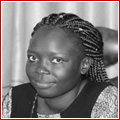Uganda, god does not uphold thee
Posted: 11 April, 2023 Filed under: Nimrod Muhumuza | Tags: anti-homosexuality law, colonial rule, Constituent Assembly, culture, For God and My Country, homophobia, Kulwa Katonda n’Eggwanga Lyaffe, National Symbols Committee, religion, religious ideologues, religious preferences, revenge killings, sexual minorities, state religion, Uganda Leave a comment Author: Nimrod Muhumuza
Author: Nimrod Muhumuza
Doctoral researcher
Politicians and religious ideologues often deploy the mantra “Uganda is a god-fearing country” and cite the motto “For God and my Country” to tip the scales on controversial or polarasing issues as if it is a substitute for reasoned, principled debate. They would have us believe that religion regulates and should dictate our conduct, going as far as suggesting that our laws should be informed or at least inspired by scripture. Contemporary religion and its ideals has been a mainstay of Ugandan politics and society, manifested in the religious wars of the 1880s, Christian-inspired colonial rule, President Idi Amin’s Sharia-inspired decrees to the raft of morality laws that have been proposed or enacted recently.
Where to Zimbabwe? Another stage set for flawed elections under Mnangagwa’s leadership
Posted: 3 April, 2023 Filed under: Nqobani Nyathi | Tags: accountability, African Commission on Human and Peoples Rights, amendment of the Constitution, by-elections, constitution, Constitution of Zimbabwe, democracy, electoral disputes, Emmerson Mnangagwa, free and fair elections, government-affiliated media, Guidelines on Access to Information and Elections in Africa, human rights, Luke Malaba, peaceful resolution, Private Voluntary Organisations Bill, PVO Bill, rise to power, unlawful killings, violence, ZEC, Zimbabwe, Zimbabwe Electoral Commission 1 Comment Author: Nqobani Nyathi
Author: Nqobani Nyathi
Doctoral Candidate and Project Officer, Centre for Human Rights, University of Pretoria
In 2018, and perhaps at the peak of his popularity, Emmerson Mnangagwa narrowly won a disputed Presidential election in Zimbabwe. In the aftermath, chaos ensued, and soldiers shot and killed people. No one has been held accountable so far, perpetuating an environment of impunity and fear. Mnangagwa’s unconstitutional rise to power the previous year had subverted democracy and as predicted, he has continuously demonstrated an unsettling disregard for the Constitution and the principles of democracy. Zimbabwe’s next general election is scheduled for some time this year, on a date yet to be announced. If Mnangagwa persists on his current path of undermining the Constitution, the election could lack the legitimacy necessary for a functioning democracy.

 Author: Cedonia Victor Legge
Author: Cedonia Victor Legge